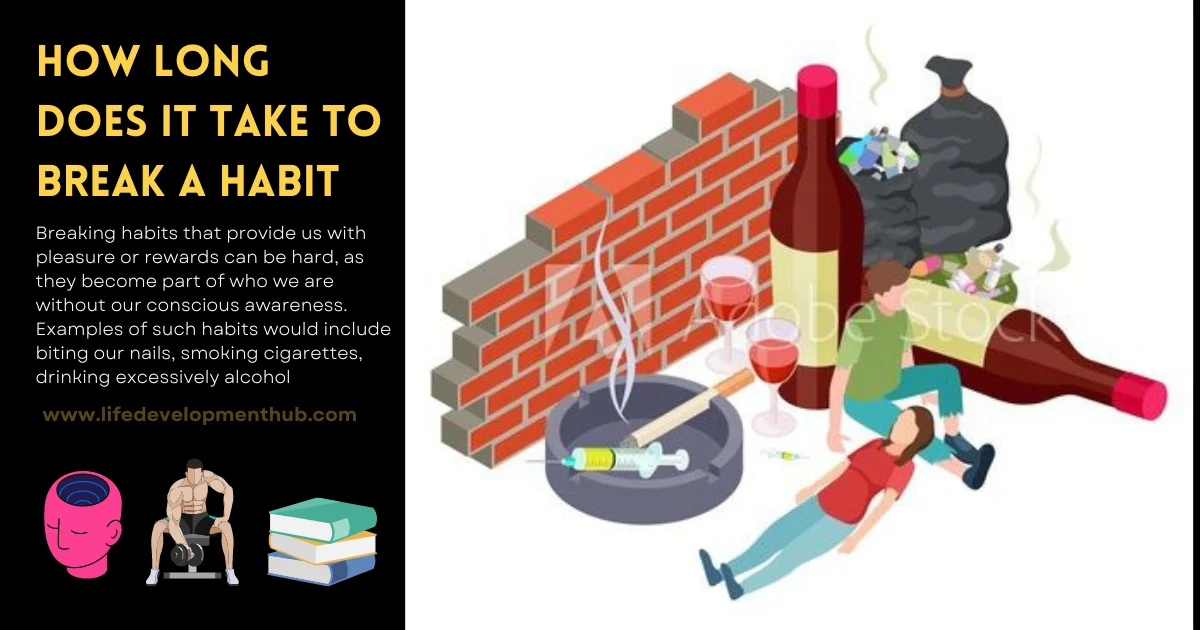How long does it take to break a bad habit and how to do it successfully? Learn the science behind habit formation and breaking, and some tips and tricks to help you change your habits for the better.
Breaking habits that provide us with pleasure or rewards can be hard, as they become part of who we are without our conscious awareness. Examples of such habits would include biting our nails, smoking cigarettes, drinking excessively alcohol and staying up late – no conscious effort made to alter these routines; (how long does it take to break a bad habit)
They just become part of who we are.
However, how do we break habits effectively and what are the steps needed for successful change? In this post we explore the science of habit formation and modification along with success-based advice.
Common belief states that all it takes to break bad habits is 21 days. This belief stems from Dr. Maxwell Maltz’s observation that his patients typically recovered from surgery within this timeframe
1.However, 21 days won’t be sufficient if you want to change a habit; each individual’s motivations and triggers (environmental or social cues that lead to it) must also be taken into consideration in breaking it
2.Ninety-six participants who wanted to change one behavior, such as eating more fruits or drinking water more regularly, or working out regularly were recruited into this study. Over a 12-week period they provided updates on their progress while researchers tracked whether it had become automatic behavior.
The results revealed that individuals displayed various forms of behaviors, with some habits more difficult to change than others.
Breaking Patterns :
It Isn’t Easier Than Ever Though breaking habits may not be easy, it is possible with proper tactics and support. Here are a few methods and techniques that may help you successfully break them:
Recognize Your Stressors.:
Triggers are cues that cause certain behaviors, like smoking around friends, biting one’s nails under stress, or snacking while watching TV. By becoming aware of them early, it will help you effectively eliminate, replace or prepare for them in a more successful manner.
Alter Your Surroundings:
Altering the environment can help decrease exposure to triggers and promote new behavioral habits, including hiding snacks, getting rid of cigarettes and moving alarm clocks away from beds.
Create Accountability Partners:
Join Forces! In your quest to break bad habits, having someone by your side who will motivate, support, and hold you accountable can make all the difference. Consider inviting a friend, relative, or coach as part of your support system in order to provide feedback and celebrate accomplishments regularly. Establish A Reward Program. Sweets or compliments may provide positive reinforcement while attending enjoyable activities can enhance new behavior for an extra reward – use an app like Habit Tracker to keep track of accomplishments and stay accountable!
Alter the behavior. Rather than trying to completely dislodge an habit, think about replacing it with something that has more advantages – for instance chew gum instead of biting your nails, drink water instead of soda, or practice meditation in lieu of scrolling your phone screen – these alternatives provide similar satisfaction or reward without any negative side effects, ensuring all its benefits can still be realized without any of its drawbacks.
Breaking bad habits often takes commitment and perseverance over an 18 to 254 day period, depending on the behavior and individual involved. You can improve your chances of success more quickly by adhering to proven strategies such as recognizing triggers, altering surroundings, seeking accountability partners or reward systems, or replacing bad ones by creating new ones – as well as following our Frequently Asked Questions how long does it take to break a habit
FAQs (frequently asked questions).
Q: What is the estimated duration necessary to break a habit?
A: Unfortunately, there is no single answer as this depends on many different elements such as its type, duration and intensity; an individual’s motivation; as well as any environmental or social cues which trigger such behavior.
What are some typical behaviors people wish to abandon?
Examples include smoking, snacking on unhealthy food items, overdrinking alcohol and having irregular sleep schedules – all which have negative impacts on their health, happiness, and productivity.
Below are a few tactics and strategies for breaking unwanted behaviors:
Identifying Stressors. By knowing the causes for certain events or situations–time, place, mood or people–you can more easily avoid, substitute or prepare yourself to react in different ways when encountering them.
Make changes in your surroundings. Altering your environment can help lessen trigger exposure and make adopting new behaviors simpler.
Form an accountability alliance. Having someone on your team to support, encourage, and keep you on track can make all the difference when trying to break bad habits.
Take advantage of a rewards program. Reward systems make new behaviors more pleasurable and rewarding while reinforcing them effectively.
Adapt the behavior: Why not aim to break an unhealthy routine entirely and replace it with one with more advantages?
Some key aspects that can help you break a habit effectively include:
Be practical. Do not expect to break a habit overnight, nor never slip back. Set attainable and achievable goals such as decreasing frequency or intensity, or gradually increasing time between repetitions. Celebrate small wins while learning from setbacks.
Understand the Root Cause. Habits may not only be behaviors but symptoms of deeper issues such as stress, anxiety, boredom or loneliness. To successfully break an unhelpful pattern of behavior you need to address the underlying source. Seek professional assistance or find alternative means of managing emotions as soon as possible.
Negative self-talk can derail your efforts to break a habit, as it lowers self-esteem and confidence. Instead of saying things such as “I can’t do this” or “I’m such a failure”, try using positive affirmations such as “I can break this habit” or “I’m proud of myself for trying”. Positive affirmations will boost motivation and self-efficacy while leaving you feeling more optimistic and hopeful.

